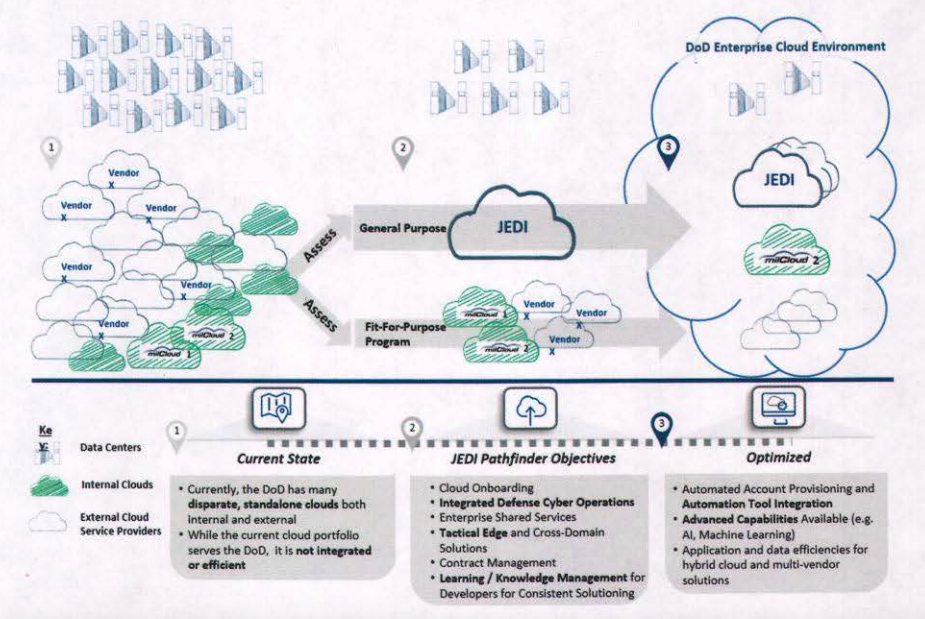Did Esper Delay JEDI? It’s Not That Simple
Posted on

Army Secretary Mark Esper talks to soldiers at Fort Drum, New York.
WASHINGTON: Newly confirmed Defense Secretary Mark Esper has promised “to take a hard look at” the JEDI cloud computing contract — but that is all he has promised. He is keeping a wide range of options on the table, ranging from a quick and informal review, one that allows the Pentagon to appease a skeptical President Trump while still awarding the contract by Aug. 23 as planned, to a total reboot of the program, which could take years.
So why was there a flurry of headlines in the last 24 hours saying Esper will “delay” the award, has put it “on hold,” or “hit…pause“? Well, that’s a plausible interpretation of an official statement provided some reporters yesterday, but it’s not what the statement actually said. In fact, we still know next to nothing about what Esper is really doing, which is no doubt entirely intentional — although some seasoned insiders have helped us analyze his options (more on that below).

President Trump with the future Chairman of the Joint Chiefs, Gen. Mark Milley, and the future Defense Secretary, Mark Esper
Oracle’s Trump Card?
The long-running JEDI saga has already gone through two formal bid protests, multiple Pentagon investigations, and an unsuccessful lawsuit by rejected bidder Oracle. The long-established IT contractor has complained bitterly and publicly that the competition was rigged to favor its younger rival Amazon Web Services. The Pentagon Inspector General, the congressional Government Accountability Office, and the Federal Court of Claims all said Oracle was wrong.
That’s where we were until President Trump said earlier this week that, “I’m getting tremendous complaints about the contract with the Pentagon and with Amazon” — owned by his nemesis Jeff Bezos — and “we’re going to take a very strong look at it.”
Those remarks prompted press inquiries to Pentagon, which in turn issued a studiously bland statement: “Keeping his promise to Members of Congress and the American public, Secretary Esper is looking at the Joint Enterprise Defense Infrastructure (JEDI) program. No decision will be made on the program until he has completed his examination.”
This statement basically repeats Esper’s earlier public statement that “I’ve heard from everybody about the JEDI contract, and that’s one of the things I want to take a hard look at.” The one new wrinkle is the sentence saying “no decision will be made” until Esper is done “looking.” The secretary himself hadn’t said so explicitly — but then it hardly needed saying, since presumably the point of the “hard look” was to make sure the decision is made correctly, not to review it after it was made.
Trump’s intervention, of course, has raised the profile of the debate and the political stakes. But Trump has taken public shots at defense programs before — he didn’t even wait to be inaugurated before blasting the F-35 Joint Strike Fighter program — with distinctly mixed results. His high-profile pressure made little difference on the F-35, may have reaped some savings on the Air Force One replacement, and so far, has had no effect on the Navy’s Ford-class aircraft carrier.
Nor is Trump the first president to publicly take issue with his own Defense Department on a major program. “It’s neither unusual nor is it unprecedented,” said David Berteau, a former Pentagon official who now heads the Professional Services Council. “It’s entirely within the president’s authority… to say ‘walk me through your thinking” on a controversial procurement. Obama, for example, publicly questioned the need for a new and badly over budget presidential helicopter back in 2009, and shortly thereafter the Pentagon cancelled the program altogether.
“It probably happens a lot more than we get to see it,” Berteau added.
“Any time that a president is hearing complaints from a lot of members of Congress, it’s pretty typical for him to go to the agency and say ‘take a look at this,'” agreed Andrew Hunter, another former DoD official who now works at the thinktank CSIS. “What’s atypical is in this case [someone] persuaded the president to look at it by displaying a picture showing Jeff Bezos and various people who work for him or have worked for him in the past … conspiring” to get Amazon the contract. (He refers to a slide depicting conflicts of interest that was circulated by Oracle). It’s also unusual to comment on an ongoing competition, he said.
But while some observers question the president’s motives for intervening, there’s no question he has the prerogative to do so. “While I’m deeply troubled by President Trump’s involvement in this procurement — given his long-term, fully transparent animus towards the apparent awardee and his demonstrated practice of acting on instinct rather than in-depth knowledge of relevant details — this may be a rare example of bad behavior leading to a positive result,” said GW law professor and JEDI critic Steven Schooner. “While DoD survived the protest, the judge’s lengthy decision made clear that the procurement process left much to be desired, both with regard to an inordinate number of conflicts of interest and a highly controversial and, to my mind, deeply flawed, acquisition strategy.”

The Defense Department’s strategy to transition to cloud computing. Note both the prominent role for the JEDI project and the parallel system of “Fit For Purpose” clouds.
Options on the Table
So if Esper wants to fix JEDI, how could he do it? And how long would it set the program back?
“I would be a little surprised if he did one meeting and they went ahead and awarded it in August as planned; that might not look particularly serious to the president,” CSIS’s Hunter told me. “I would expect it would be at least be a couple of a weeks, [which] would kick back the award out of August into the fall.”
Berteau agreed: “I would think that the review’s going to be very serious and it’s going to look hard at what DoD’s changing requirements are … not window dressing.”
Esper has two fundamental options: to endorse the JEDI process or to overturn it. “If they find the same thing that the bid protest, the IG investigation, and the Court of Claims review found, which is the government acted within its rights and it was not critically tainted by unethical behavior…. that could still result in a little bit of a delay but probably not a giant delay,” Hunter told me. “The second main possibility is Sec. Esper decides he’s not comfortable with the contract as structured.”
Now, there might be ways to change the outcome without changing the letter of the contract. While most reports (ours included) sum up JEDI as a 10-year, $10 billion contract, that’s actually the maximum value if the Pentagon exercises all options. If DoD does the minimum instead, Hunter said, JEDI could be over in two years, freeing the Pentagon to try again.
Alternatively, even though the government has repeatedly said it wants to contract with just one company, the way the existing JEDI solicitation is written, it could split the award between the two qualified vendors, Microsoft and Amazon. “That is doable,” Berteau told me. “It has happened in the past.”
That said, Berteau continued, overseeing two vendors could require more effort and overhead for the government than overseeing one, so there might need to be some organizational and funding changes to actually split the buy. Even so, this wouldn’t necessarily require much of a delay..
However, changing from a single award to a split award at this point might also open the government up to another round of protests and even lawsuits. And since Oracle is already disqualified, it wouldn’t be eligible for a split award anyway, so they’d have little incentive to accept that outcome.
If the government actually wants to give Oracle another chance, it needs to start over. At a minimum, it has to say its original analysis of which vendors meet or don’t meet the minimum requirements is now obsolete and must be redone to reflect the competitors’ new investments and technological progress. More likely, the government would also have to rewrite the requirements themselves — which could send them back to the beginning of an arduous bureaucratic process.
So a do-over to give Oracle another shot, Berteau said, “sets you back months or years.”
Can the Pentagon afford that? JEDI is not just a backoffice IT upgrade, but the backbone of the future warfighting network worldwide. The military envisions JEDI servers not just at data farms in the US but on forward bases, warships, even in trucks and backpacks. What’s more, because it can combine lots of different organizations’ data in a common pool and provide massive computing power to analyze it, cloud computing is central to the Pentagon’s strategy to advance artificial intelligence.
“My concern is that the longer the JEDI contract remains in flux, the longer the Department is going to keep spinning its wheels on AI,” said CSIS scholar Lindsey Sheppard. “By not deciding how to proceed with cloud we are in effect deciding to not compete on data and analytics.” As the armed services struggle to deploy AI, Sheppard told me, “they should also be thinking seriously about how they will get the computing power necessary as JEDI stalls.”
Subscribe to our newsletter
Promotions, new products and sales. Directly to your inbox.
